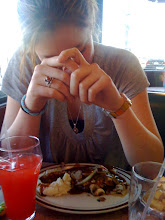
i wanted to run a marathon; my femurs did not. the green arrows are pointing to half moons of increased bone activity. my legs had been bothering me for a couple of weeks and stretching hadn't been helping, so i decided to go see the sports medicine doctor i saw my junior year of high school (two stress fractures right tibia, one stress fracture left tibia). upon seeing that x-ray on the left, dr. moeller felt awful, not just because the half-moons indicated fractures in both femurs, but because he hadn't thought to x-ray above the knee on my first visit and had instead sent me for a bone scan, which was unnecessary intense radioactive exposure.
(quick aside one: i scoffed while my mother and dr. moeller went on and on about excessive radioactive exposure. i stopped scoffing when my mother told me the reason my cousins' grandmother had such bad arthritis, among other foot problems that resulted in the amputation of a few toes. when she was a child, her father had owned a shoe store, and apparently back in the day someone had decided that the best way to fit shoes was to measure each customer's feet with x-rays. little patsy mccracken (her real name, i promise, though she changed it to lynn when she was older) had come home from school and x-rayed her feet every day.)
(quick aside two: the bone scan did reveal a fracture in my ankle. in the only intermural soccer game i played in, i had accidentally tripped this guy really hard during a corner kick. it never occurred to me that i had tripped him hard enough to break my ankle...woops)
dr. moeller's mistake, if you will, is no reflection on his competence as a doctor. in addition to being the largest and longest bone in the human body, the femur is also, along with the temporal bone of the skull, one of the two strongest bones. the reason he didn't expect mine to be fractured is because it's pretty hard to do, given femurs can support up to thirty times an individual's weight.
the thing is, dr. moeller's reading and interpretation of those two little shadows only served to give a name to the pain i was experiencing. there's nothing much to be done about femoral (not in any way ephemeral) fractures. his advice: take two tylenol in the morning and walk it off. my legs hurt just as badly as they did prior to the sensation's categorization, but at least i had something to tell my friends who had described and mocked my labored limping gait as, "walking like [i] had a stick up my ass." their sympathy was fleeting and they still thought it was hilarious to imitate the way my knees didn't bend.
ha. ha. ha.
there is a larger point to all of this. what's fascinating about the human systems of spoken and written language is their use of abstraction. abstracts differ from referents in that they serve to represent things that may not exist in reality (physically), or, exist only as sensory experience. from an ontological perspective, abstract is about properties and relations to mark the fact that, if they exist, it isn't in space or time, but that instances of them can exist in many different places and times.
think about it this way. if an abstract is visceral (to know what red means you have to have seen something that color), until you've experienced it, the word is irrelevant and useless. imagine my situation. it demonstrates that it is also possible to have a visceral experience without knowing that a word exists to describe it, and that abstracts can be finicky because of their subjective nature. although the pain i described to the doctor was actually that of femur-stress-fractures, my lack of familiarity with the term necessitated an alternate means of communication or mediation (the x-rays) for us to understand each other.
let's go back to the ontological definition for a moment. abstracts don't exist temporally, but instances of them do. my broken legs taught me what femur-stress-fractures feel like, but i can't recreate that sensation. in fact, despite how awful it was to walk for three months, the physicality of the sensation is gone for good, unless i somehow manage to injure myself the same way again.
abstraction can be an excellent means of communicating about the conceptual aspects of human existence, but it's clear that there are limitations. i'm not worried much about the experience-dependent part but the potential loss of specificity troubles me a bit. our interactions with the world are mediated through our own specific umwelts, or self-centered worlds. the way we interpret or perceive stimuli depends on the structure of our semiotic world, which contains signs and symbols for all meaningful aspects of our world; when we interact with other individuals with their unique umwelts, we create semiospheres in which signs are simultaneously and continually creating a new environment. the single largest problem is that our signs and symbols are socially constructed attempts at describing sensation.
maybe i'm getting overly worked up about something that's not so important. maybe every experience does not need to be communicated in explicit detail, or maybe there just isn't language ready to do that YET. in my other project, which i'll go into more later, i'm trying to explore just that dilemma, or rather, how to navigate other forms and combinations of expression in search of some yet to be defined understanding of something yet to be defined. as far as i'm concerned, there are no limitations to human experience, only the ways we choose to describe or depict them.

No comments:
Post a Comment